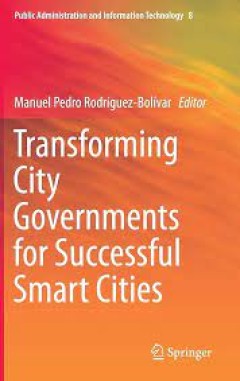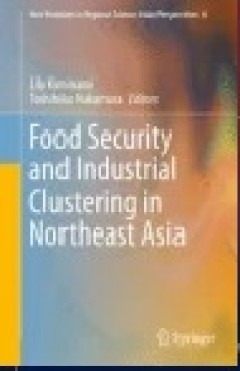Filter by

Transition of the Yangtze River Delta From Global Manufacturing Center to Gl…
This is the first English book that presents a professional analysis of the recent dynamic movement of the Chinese economy by focusing on the Yangtze River Delta region, which is the main engine of the Chinese economy. The impact of the international financial crisis on China’s economic development requires a change from the first wave of economic globalization oriented toward exports to the …
- Edition
- -
- ISBN/ISSN
- 978-4-431-55178-2
- Collation
- -
- Series Title
- -
- Call Number
- -

Transforming City Governments for Successful Smart Cities
There has been much attention paid to the idea of Smart Cities as researchers have sought to define and characterize the main aspects of the concept, including the role of creative industries in urban growth, the importance of social capital in urban development, and the role of urban sustainability. This book develops a critical view of the Smart City concept, the incentives and role of govern…
- Edition
- -
- ISBN/ISSN
- 978-3-319-03167-5
- Collation
- -
- Series Title
- -
- Call Number
- -

Trade Strategy in East Asia From Regionalization to Regionalism
The study of regionalism is essential as it has become a vital trend with profound regional and global impacts. Japan, Korea and China are regarded as the key actors for such action in East Asia. While regionalization has created building blocks for economic integration, the act of exclusion from regionalism will only lead to marginalization. Therefore, it is important to learn how to make it w…
- Edition
- -
- ISBN/ISSN
- 978-1-137-56967-7
- Collation
- -
- Series Title
- -
- Call Number
- -

Towards a Dynamic Regional Innovation System Investigation into the Electron…
Embedding the theoretical discussion on the framework of evolutionary regional innovation systems (RIS), this book reveals the informal nature of the emerging RIS in China, within which interactive learning is organized on the basis of social networks. Furthermore, in a comparative study in the Pearl River Delta, China demonstrates that dirigiste governance in the initial industrialization phas…
- Edition
- -
- ISBN/ISSN
- 978-3-662-45416-9
- Collation
- -
- Series Title
- -
- Call Number
- -

Tourism in Latin America Cases of Success
This book presents eleven case studies of success about Latin America tourism. The cases are embedded in a framework describing the economic and cultural foundations of tourism development in the continent. Mexico, Brazil, Chile and Costa Rica are some of the Latin countries which have become examples and models for touristic development, respect for the environment and social inclusion. The bo…
- Edition
- -
- ISBN/ISSN
- 978-3-319-05735-4
- Collation
- -
- Series Title
- -
- Call Number
- -

Three Domain Modelling and Uncertainty Analysis Applications in Long Range I…
This book examines in detail the planning and modelling of local infrastructure like energy systems, including the complexities resulting from various uncertainties. Readers will discover the individual steps involved in infrastructure planning in cities and territories, as well as the primary requirements and supporting quality factors. Further topics covered concern the field of uncertainty a…
- Edition
- -
- ISBN/ISSN
- 978-3-319-19572-8
- Collation
- -
- Series Title
- -
- Call Number
- -

Impact Assessment in Tourism Economics
This book presents a series of studies on the socio-economic impacts of tourism, with a special focus on the determinants of tourism competitiveness at the destination level. The authors offer a systematic overview of this important issue, presenting relevant empirical studies from different parts of the world, based on modern theoretical approaches and adequate analysis tools, in the context o…
- Edition
- -
- ISBN/ISSN
- 978-3-319-14919-6
- Collation
- VI, 273
- Series Title
- -
- Call Number
- 300 IMP

Food Security and Industrial Clustering in Northeast Asia
This book integrates diversified methodologies of area studies, regional economic development, regional science, and related fields to draw up a strategy for forming the “regional food industrial cluster” in Northeast Asia. This is done by assigning “innovation” to a core concept, with the basic problem of food security as the horizontal axis and the areas of Northeast Asia as the verti…
- Edition
- -
- ISBN/ISSN
- 978-4-431-55282-6
- Collation
- XII, 282 hlm.
- Series Title
- New Frontiers in Regional Science: Asian Perspectives
- Call Number
- -

The Towers of New Capital Mega Townships in India
With mega townships as the tool, this book analyses the complexity, scale and the challenges associated with the development paradigm in India from various built environment lenses. The Towers of New Capital is an enquiry into how these 'global fixes' are leading to territorial reorganization.
- Edition
- -
- ISBN/ISSN
- 978-1-137-58626-1
- Collation
- -
- Series Title
- -
- Call Number
- -

The Socioeconomic Evolution of the European Union Exploring the Electronic F…
This volume explores the role of territory in the creation, maintenance and extension of a new type of frontier, the electronic frontier, from a social and economic point of view. It departs from the earlier concepts of borders – state, social, economic, ethnic, religious, etc. – to investigate the fluidity of borders and their shift towards an axis-based paradigm within the free-movement …
- Edition
- -
- ISBN/ISSN
- 978-3-319-40304-5
- Collation
- -
- Series Title
- -
- Call Number
- -
 Computer Science, Information & General Works
Computer Science, Information & General Works  Philosophy & Psychology
Philosophy & Psychology  Religion
Religion  Social Sciences
Social Sciences  Language
Language  Pure Science
Pure Science  Applied Sciences
Applied Sciences  Art & Recreation
Art & Recreation  Literature
Literature  History & Geography
History & Geography